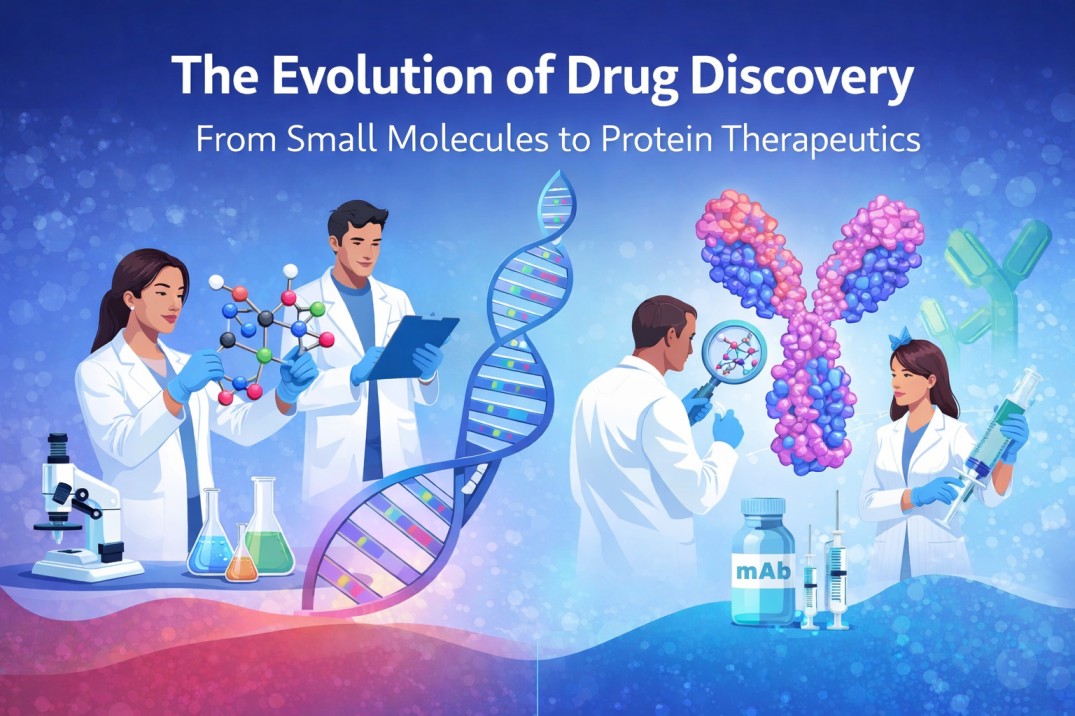Introduction
The landscape of drug discovery has undergone significant changes over the years. Traditionally dominated by small organic molecules, the field has expanded to include large molecules like proteins, thanks to advancements in recombinant DNA technology. This article explores the journey from traditional small-molecule drugs to the increasingly important role of large molecules in modern therapeutics.
Traditional Small Molecule Drugs
Methods of Discovery
In the past, small molecules, typically with a molecular weight of less than 500 Da, were the mainstay of drug discovery. These were often discovered through serendipitous observations of plant extracts or individual chemicals’ effects on animals or humans. However, modern drug discovery relies more on high-throughput screening of extensive libraries containing millions of compounds.
From Hits to Leads
Initial hits from these screenings are rarely market-ready drugs. They often lack the desired specificity, affinity for the target, and pharmacological properties. Medicinal chemists then synthesize derivatives of these hits to optimize these parameters. This process, once driven by trial and error, now frequently employs high-resolution structures of the drug bound to its target, obtained through techniques like X-ray crystallography and nuclear magnetic resonance (NMR).
Computational Approaches
The ultimate goal is to achieve drug discovery entirely through computational methods. Imagine databases containing detailed chemical information about millions of compounds and structural information about all human proteins. The computational approach aims to find high-affinity interactions between these chemicals and proteins, predicting not just the structural but also the functional consequences of such binding.
Large Molecules: The New Frontier
Protein Therapeutics
Before the advent of recombinant DNA technology, protein therapeutics were rare. Insulin, introduced in 1921, was one of the few exceptions. However, gene cloning and the production of proteins in bacteria or eukaryotic cells have revolutionized this field. Proteins can now be designed, customized, and optimized using genetic engineering techniques.
Types of Protein Therapeutics
Proteins used therapeutically include hormones, growth factors like erythropoietin and granulocyte colony-stimulating factor, cytokines, and a number of monoclonal antibodies used in the treatment of cancer and autoimmune diseases. These proteins can be “humanized” to minimize immunological reactions.
Other Macromolecules
Besides proteins, other types of macromolecules like antisense oligonucleotides and siRNAs are also being used therapeutically to block gene transcription or translation.
Conclusion
The field of drug discovery has come a long way from its reliance on small organic molecules. While these traditional compounds continue to play a significant role, large molecules, particularly proteins, are becoming increasingly important in the therapeutic landscape. Advances in technology, particularly in high-throughput screening and computational methods, are accelerating this shift, promising a new era in drug discovery and therapeutics.
Bibliography: Goodman & Gilman’s: The Pharmacological Basis of Therapeutics, 13e Brunton LL, Hilal-Dandan R, Knollmann BC. Brunton L.L., & Hilal-Dandan R, & Knollmann B.C.(Eds.),Eds. Laurence L. Brunton, et al.
Medical Disclaimer
The medical information on this post is for general educational purposes only and is provided by Pharmacology Mentor. While we strive to keep content current and accurate, Pharmacology Mentor makes no representations or warranties, express or implied, regarding the completeness, accuracy, reliability, suitability, or availability of the post, the website, or any information, products, services, or related graphics for any purpose. This content is not a substitute for professional medical advice, diagnosis, or treatment; always seek the advice of your physician or other qualified health provider with any questions you may have regarding a medical condition and never disregard or delay seeking professional advice because of something you have read here. Reliance on any information provided is solely at your own risk.

